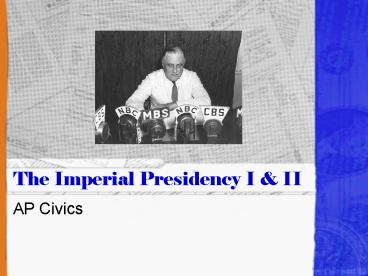The Imperial Presidency I - PowerPoint PPT Presentation
1 / 17
Title:
The Imperial Presidency I
Description:
AP Civics What does imperial presidency mean? Arthur Schlesinger wrote The Imperial Presidency in 1973 What President do you think it was written about? – PowerPoint PPT presentation
Number of Views:133
Avg rating:3.0/5.0
Title: The Imperial Presidency I
1
The Imperial Presidency I II
- AP Civics
2
What does imperial presidency mean?
- Arthur Schlesinger wrote The Imperial Presidency
in 1973 - What President do you think it was written about?
- Belief that presidential power had grown
excessive - Is there any defense to this?
- Economic growth necessitated a strong executive
branch - Congress delegated strong powers to the
President! (ex. Foreign policy)
3
Where have there been areas of abuse?
- War Powers
- Congress has the
- power to declare it
- The President is
- commander in chief!
- Our Presidents have sent in troops w/o declaring
war more than 125 times! - Mostly after 1945
- Congress has generally gone along w/him
- One reason decl. war would give him emergency
powers!
4
How have executive agreements been abused?
Bush and Latin American leaders meeting on
foreign trade.
5
Executive Agreements
- These do not require Senate ratification
- There are deals between the Prez. heads of
other nations - Since WWII these have greatly outnumbered
treaties! - Why might this irritate Congress?
- Ironically, treaties are often forged on trivial
matters - Executive agreements are of great importance!
(but die after Prez.)
6
Whats the problem with executive privilege?
7
Executive Privilege
- Def the right of the president to not divulge
conversations between self and advisors - Shouldnt they have this right?
- Defense if not, advisors would be hesitant to be
straightforward to him - Critics Presidents have abused it by claiming to
protect national security - US v. Nixon (1974) President is entitled, but
not in criminal cases
8
Impoundment
- Def the refusal to spend money that has been
appropriated by Congress - Why would the President do this and is it right?
- Main reason- no longer able to use line-item veto
- He will use to withhold funds from certain
types of bills - Nixon did it for policy objectives
- Congress furious! Constitutional?
9
The use of the veto
- The mere threat of a veto can influence changes
in legislation - Difficulty of overriding veto gives Prez. A great
advantage (2/3 vote) - 93 vetoes are sustained!
Source Gallup
10
Which presidents would you consider imperial?
11
End of Part One
12
What events caused Congress to reassert its
authority?
- The Vietnam War
- The Watergate Scandal
- The Resignation of Nixon
Reassertion of Power
13
The War Powers Act of 1973
- The Prez. can send in troops, but only under
these circumstances - Notifies Congress within 48 hrs.
- Must withdraw troops after 60 days
- Must consult with Congress
- Congress may pass resolution to withdraw
- What criticisms might exist?
- Unconstitutional? Ties the hands of the Prez?
Enemy can just wait it out!
Reassertion of Power
14
The National Emergencies Act of 1976
- The President must inform Congress in advance to
using emergency powers - State of emergency ends after six months
- Can declare another six, subject to review
Reassertion of Power
15
How did Congress feel about the CIA?
- Past CIA abuses
- Investigations of abuses in 1970s
- 1974 Congressional oversight Committees created
- Foreign Intelligence Surveillance Act (1978)
- Est. FISA court to authorize electronic
surveillance
Reassertion of Power
The Iran-Contra Scandal
16
How did Congress combat impoundment?
- The passage of the Budget and Impoundment Control
Act of 1974 - Prez impounds funds temporarily-gt either house
can override - Prez impounds funds permanently-gt act is
automatically voided - CBO (Congressional Budget Office) est. as check
on OMB - Budget committees formed
Reassertion of Power
17
Other ways of combating Prez power
- Confirmation of appointees
- Senatorial courtesy, borked, delays and holds
- The Legislative Veto
- Was a way of forcing the bureaucracy to conform
to congressional intent - 1983 declared unconstitutional by the SC
- Oddly, can still work if not challenged?
- Foreign Affairs
- Appropriations power to influence foreign policy
- Congress cut off aid to S. Vietnam, Angola, the
Contras
Reassertion of Power































